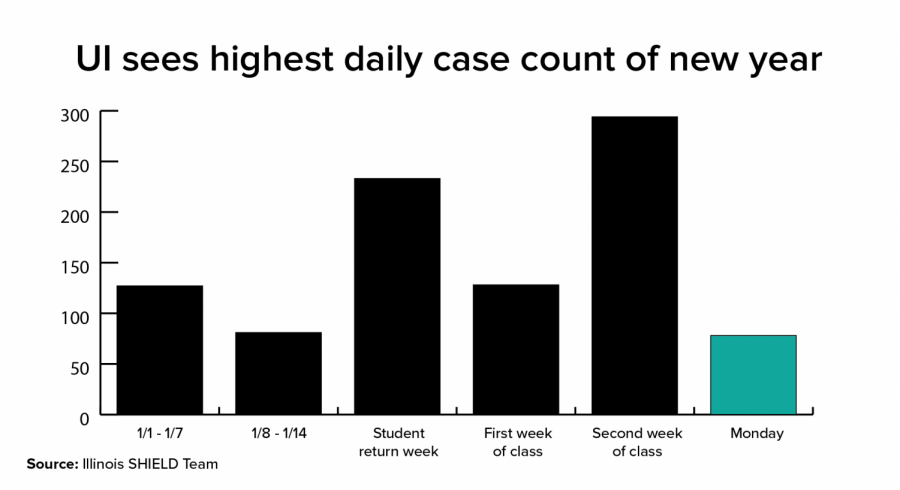UI lifts restrictions as new cases increase
Feb 11, 2021
The University’s COVID-19 trend isn’t anywhere near where it was a semester ago, but it’s not encouraging either.
The same day the University lifted its “essential activities only” directive for students, Monday’s COVID-19 tests brought back 78 new cases of the virus — a new daily high for 2021.
Even Sunday’s case count — 42 new unique positives — is the highest daily total on Sunday since campus’s August surge in cases. Weekends always draw far lower testing totals.
So why lift the restrictions in the first place? According to University officials, the cases are confined to certain identifiable clusters, while continued restrictions would be tough on community stakeholders and could have impacts on student mental health.
“It is difficult to sustain an essential services-only period for an indefinite amount of time,” Robin Kaler, spokesperson for the University, said during Monday’s UI Senate meeting.
Get The Daily Illini in your inbox!
The restrictions had lasted since Jan. 20, five days before classes began for returning students. During the first week of class, only 128 new cases of COVID-19 were identified.
However, even in Chancellor Robert Jones’s Massmail announcing the lifted restrictions, he urged “extreme caution” in daily interactions, and acknowledged a “small spike” in cases attributed to student noncompliance.
This increase comes just as the B117 variant has been confirmed on campus, though it’s not clear how much of an effect the variant has had on new cases. Regardless, the uptick is not very small; 294 cases in the second week of class is the highest since early November, when the virus was surging across the country.
According to Rebecca Lee Smith, the University’s epidemiologist and associate professor in pathobiology, the majority of the spread on campus is currently taking place in a handful of housing units on and off-campus.
Smith said the University may revert to an essential activities order if there was evidence of the virus-carrying out from campus into the broader C-U community.
“We have to balance these broad strong activities orders with these effects on student mental health and well-being,” she said. “We needed the broad approach to start the year. Now we have a little better sense and can target clusters a little more closely.”
One behavior may help stymie the spread, though: regularly attending class.
“We have evidence from the fall semester, people who attend in-person classes are less likely to be infected,” she said. “In-person classes are not a risk factor.”
With building access restricted to those who keep up with testing patterns, in-person class tends to encourage good COVID-19 etiquette for those on campus.
Even with restrictions lifted, the next few weeks are no time for reckless abandon.
“Please do not take this as an invitation to break COVID-19 safety guidance and have parties,” Jones wrote in the Massmail. “We know that if this happens, our positivity rates will spike, and those who participate could suffer health risks, face university discipline, and the university will be forced to enact another essential activities only period. I do not want this. You do not want this. Please help me in encouraging your friends and peers to continue to be vigilant.”
@esimmsnews






